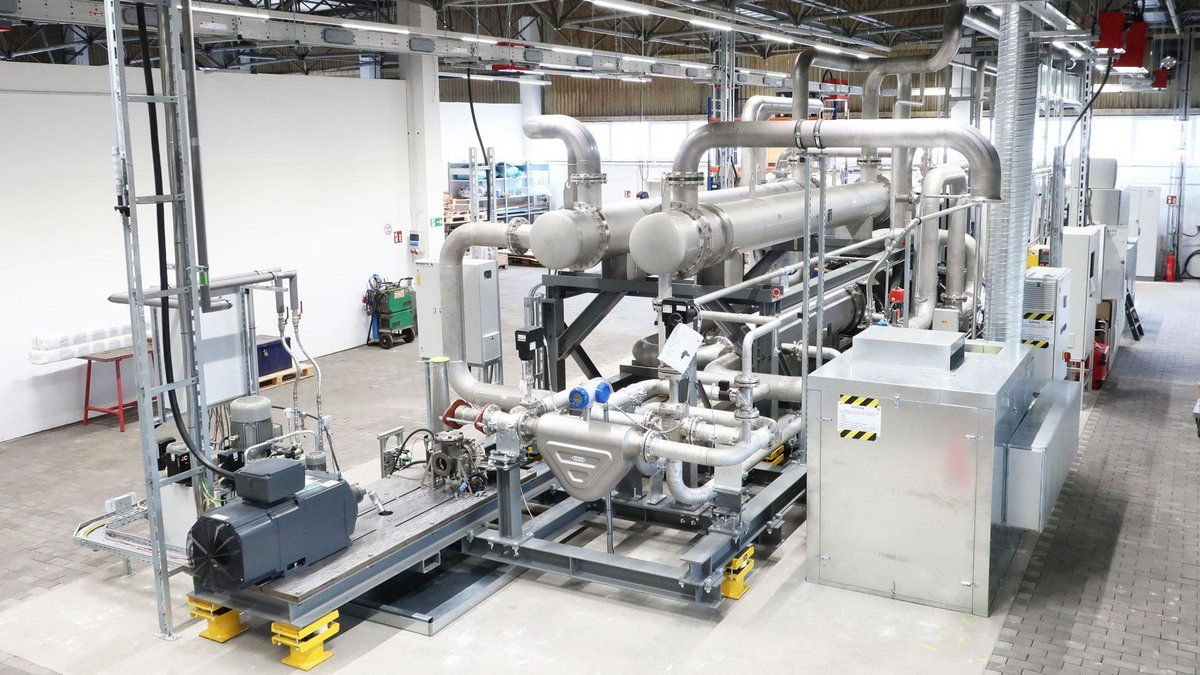CoBra supports the heat transition in industry
Research and Science Minister Dr. Manja Schüle is pleased about today's commissioning of the Cottbus Brayton Facility pilot plant (CoBra for short) of the DLR Institute of Low-Carbon Industrial Processes in Cottbus: "Structural development in Lusatia is picking up speed: Last year, we opened the DLR Institute of Low-Carbon Industrial Processes - today, the CoBra test facility is already starting up. The fast pace is justified and necessary: Lusatia needs prospects for the future - and it needs them today. And Germany and Europe need answers to the challenge of climate change - and fast. I am convinced that we can only achieve this through innovative research, 'made in Brandenburg'. This is exactly what the DLR Institute stands for with its new CoBra pilot plant. The high-temperature heat pump is an alternative to fossil fuels and is designed to show how it is possible to reduce carbon dioxide emissions while providing heating and cooling for industry. I am proud that we were able to support the start of the pilot plant with two million euros in state funding," said Minister Schüle. "The DLR Institute fits right in: Lusatia is currently developing into a European model region for a climate-neutral economy - and the DLR Institute is a core project of this development. As an industrial and energy region, Lusatia stands for change, transformation and new beginnings. And for strong networking between science and industry. This is where innovations are created, where transfer succeeds, where the future is made."
Institute Director Prof. Dr. Uwe Riedel: "We are able to achieve values that are unique in the world to date in terms of temperature lift and heat release temperature of 300 degrees Celsius with a heat output of around 200 kilowatts," says Institute Director Riedel. In the future, the aim is to go much further: "The DLR heat pumps will reach a temperature range for which there has been no technical realization to date. These temperatures are necessary for a low-CO2 conversion of the corresponding industrial processes."
Prof. Dr. Karsten Lemmer, DLR Executive Board member for Innovation, Transfer and Scientific Infrastructures. "With all the problems of our time, it is great to see that we as DLR are contributing to solutions with transfer from research to industry. CoBra has the potential to enable massive CO2 reductions. At the same time, we are creating jobs in the region and preserving jobs in Germany as a business location by keeping the production of energy-intensive industries competitive through innovation."
Prof. Dr.-Ing. habil. Michael Hübner, Vice President for Research and Transfer at BTU Cottbus-Senftenberg: "At BTU Cottbus-Senftenberg, we are shaping practical solutions for a sustainable and climate-friendly future in our four profile lines, including 'Energy Turnaround and Decarbonization', together with the DLR Institute of Low-Carbon Industrial Processes. The new pilot plant opens up a wide range of opportunities for innovative research projects and, in addition, for scientists* and students in scientific training, for example, for doctoral theses and student research projects."
The transnational DLR Institute of Low-Carbon Industrial Processes, located in Cottbus and Görlitz/Zittau, has been under construction since July 2019 and was officially opened in May 2021. The institute in Brandenburg focuses on simulation and virtual design - the 'digital twin' - of modified production processes. In addition, the focus is on the development of high-temperature heat pumps. In the future, 60 scientific employees will work there. The federal government is providing more than five million euros annually for the new institute in Cottbus. Brandenburg is contributing 10 percent of the annual funding for the Cottbus site under the current federal-state funding formula. In addition, the state is providing around 45 million euros as part of its structural funding for the construction of a new building with a test hall, laboratories and office space.
The Cottbus Brayton Facility (CoBra) pilot plant is the institute's entry into experimental research and the first step on the way to demonstrating the feasibility and applicability of high-temperature heat pumps for industrial process heat supply. A large proportion of industries require process heat between 100 and 500 degrees Celsius, for example the food industry, the paper industry and the chemical industry. Here, CO2 emissions can be reduced if alternatives to fossil fuels are available. If renewably generated electricity is used, high-temperature heat pumps are climate-neutral. At the same time, industrial plants can save energy with high-temperature heat pumps. For the preparations and construction of the plant in Cottbus, DLR has primarily selected companies from the region. In the future, a larger CoBra test facility will be developed and built, which will enable even higher temperatures and a higher heat output. Research on high-temperature heat pumps is also planned for the second DLR site in Zittau.
The establishment of the new DLR institute is one of a number of federally funded projects designed to contribute to structural development in lignite regions. With the switch to renewable energies for a low-emission energy supply, lignite mining is being gradually phased out.

